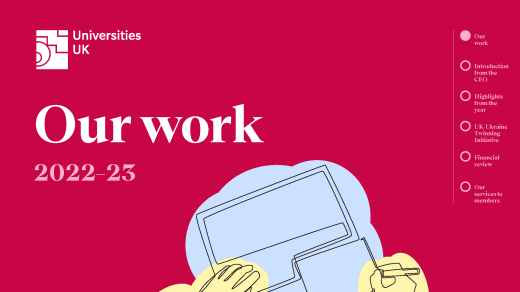Stay up to date with our work
Our monthly updates are a great way for you to stay up to date with our work, events, and higher education news.
Over the past year, we've supported our members through our policy and advocacy work.
Funding
Lifelong learning
Research and innovation
Security
Growth
Regulation
Free speech and academic freedom
Admissions
Quality
Tackling harassment
Student mental health
Cost of living
We have responded robustly throughout the year to the speculation that the UK government may look to cut international student numbers, or remove the Graduate route visa.
We have:
Benefits of international education
#WeAreInternational
We explained why research happening at universities matters
We highlighted the positive impact of universities, in numbers
We launched our podcast, 'The future of higher education today'
Universities serve society in many ways, and through our ability to convene university leaders and influence policy, we will make a stronger contribution to national growth, individual opportunity and the search for solutions, innovations and discoveries.
Vivienne Stern MBE
President, Universities UK
Following the invasion of Ukraine, the UK higher education sector stepped up to support their counterparts in Ukraine. The most significant development of this has been the UK-Ukraine University Twinning Initiative.
Developed in partnership between Universities UK International (UUKi) and Cormack Consultancy Group (CCG), this initiative enables UK universities to support their Ukraine counterparts both through short-term aid and longer-term strategic activity, through institution-to-institution collaboration. This work has been funded by the Foreign, Commonwealth and Development Office (FCDO) and UK Research and Innovation (UKRI)/ Research England.
I’ve a feeling that our people have started to breathe again. They’re getting hope. It’s because of your university [University of York via the twinning scheme] that they start to smile again.
Professor Tetyana Kaganovska
President, Karazin Kharkiv National University


Our monthly updates are a great way for you to stay up to date with our work, events, and higher education news.